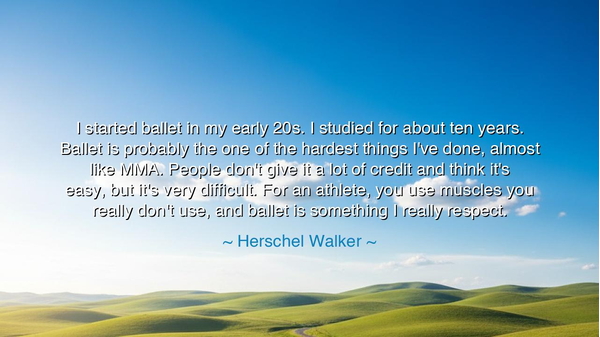
I started ballet in my early 20s. I studied for about ten years.
I started ballet in my early 20s. I studied for about ten years. Ballet is probably the one of the hardest things I've done, almost like MMA. People don't give it a lot of credit and think it's easy, but it's very difficult. For an athlete, you use muscles you really don't use, and ballet is something I really respect.






Hearken to the words of Herschel Walker, a warrior of the field who turned his gaze to the ethereal discipline of ballet, and in doing so revealed a truth that resonates across the ages: mastery is never granted by ease, but earned through struggle, reverence, and sweat. He confesses that he began ballet in his early twenties, a time when most would deem it too late, yet he devoted ten years of relentless study. In this devotion, he discovered a challenge akin to the fiercest of battles, a test of body, mind, and spirit that rivals even the brutal discipline of MMA. Here lies the eternal lesson: greatness is not measured solely by beginnings, but by courage, persistence, and respect for the path itself.
Since time immemorial, humans have sought disciplines that demand more than the ordinary. Recall the ancient Spartans, whose youth were forged in the crucible of rigorous training, where every movement honed the body and tempered the soul. Like Walker embracing ballet, they faced challenges that required muscles and faculties they had never used, and in doing so, they discovered reserves of strength, endurance, and humility previously unimagined. Walker’s acknowledgment that ballet is “very difficult” reminds us that true skill often conceals itself behind a veil of apparent effortlessness—a truth the world too often forgets.
Consider the tale of Martha Graham, the iconic dancer who devoted decades to perfecting the language of movement. She trained relentlessly, each contraction and release a dialogue with her own limitations, each performance a testament to the rigor of discipline. Just as Walker compares ballet to MMA, Graham’s art demanded physical power, mental fortitude, and emotional vulnerability. Both exemplify that mastery, whether in combat or art, requires surrender to discipline and respect for the subtle forces that shape human potential.
Walker’s insight also reveals a profound respect for the unseen: muscles and skills that lie dormant until summoned. In ballet, as in life, we encounter challenges that stretch us beyond familiar strength, demanding precision, flexibility, and endurance. To confront these trials is to recognize the vast potential of the human body and mind, and to cultivate admiration for the craft itself. In this, Walker exemplifies a lesson the ancients cherished: respect is born not only from achievement, but from grappling with difficulty and embracing the humility it instills.
The modern athlete’s journey into ballet illuminates the intersection of art and discipline. On one side lies the brute strength and strategy of physical combat; on the other, the grace, timing, and control demanded by dance. Walker’s comparison to MMA underscores a universal truth: any endeavor that stretches the human spirit and body is worthy of reverence. What seems effortless to the observer is forged through years of persistent, often unseen labor. This is the wisdom passed down from the Stoics, who reminded us that excellence is crafted in hidden moments, not in public applause.
In reflecting upon Walker’s decade of devotion, we encounter a timeless moral: to truly excel, one must challenge oneself in ways unfamiliar and demanding, and remain steadfast despite external doubt or misunderstanding. Ballet, often underestimated by those who witness only its surface beauty, becomes a metaphor for life’s most rigorous undertakings. To engage fully with difficulty is to awaken muscles, talents, and virtues previously untested. It is through this labor that respect, skill, and self-knowledge are born.
From this, the practical guidance emerges for all who seek mastery: embrace disciplines that challenge you, even those that seem foreign or impossible. Dedicate years to deliberate, consistent effort, honor the craft, and cultivate both strength and humility. Like Walker, let your journey reveal the hidden capacities within you, and let your admiration for the craft guide your perseverance. In doing so, the arduous path transforms into the forge of character, the crucible in which resilience, skill, and reverence are tempered.
So heed this teaching: greatness demands courage, discipline, and respect for difficulty. Whether in art, sport, or the trials of everyday life, pursue what stretches you, honor what challenges you, and approach every task with devotion. Ballet is not merely movement, and MMA not merely combat; they are mirrors reflecting the universal struggle to exceed oneself. Let this awareness guide your hands, your body, and your spirit, that you may emerge stronger, wiser, and ever in awe of the arduous beauty of mastery.






AAdministratorAdministrator
Welcome, honored guests. Please leave a comment, we will respond soon